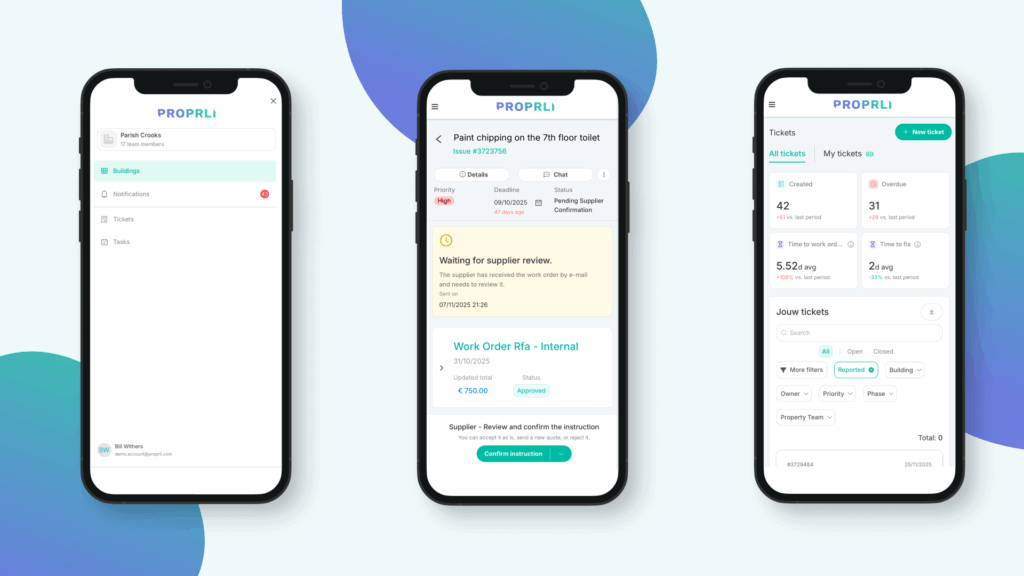Property management is a dynamic and rapidly evolving sector, crucial in the real estate market. It encompasses both residential and commercial properties, ensuring their efficient and profitable operation. Property managers oversee various aspects of these assets on behalf of owners or investors. This includes maintenance, tenant relations, rent collection, and financial management.
Property management companies may also provide additional services. These include marketing and leasing, property inspections, and handling legal matters. They act as a bridge between property owners and tenants, ensuring satisfaction and proper maintenance. Whether managing residential units or commercial spaces, their aim is to enhance real estate value through effective maintenance, leasing strategies, and asset management.
Key Takeaways
- Property management involves overseeing real estate properties on behalf of owners or investors
- Services include maintenance, tenant relations, rent collection, and financial management
- Additional offerings may include marketing, leasing, inspections, and legal matters
- Property managers liaise between owners and tenants to ensure satisfaction and proper maintenance
- The goal is to maximize property value through effective strategies and management techniques
Overview of the Property Management Industry
The property management industry is crucial in the real estate sector, ensuring properties are well-maintained and efficiently operated. With a rising demand for professional services, the industry has seen steady growth. The market size has expanded, highlighting its growing role in the real estate world.
Industry trends significantly influence property management practices, pushing for the adoption of new technologies. These advancements aim to boost efficiency and customer service. Companies use advanced software to automate tasks and gain deeper insights into property performance. Such technologies are key to remaining competitive in the dynamic market.
Over 53% of property management companies now use software to improve their operations. This widespread adoption shows the industry’s dedication to using technology to enhance services and stay competitive.
On average, a property management company oversees about 300 properties. Larger firms manage over 1,000 properties. This scale underscores the industry’s significant responsibility and the expertise needed to manage diverse property portfolios effectively.
Types of Properties Managed by Property Management Companies
Property management companies handle a broad spectrum of real estate, encompassing both residential and commercial properties. In the residential realm, they manage single-family homes, apartment buildings, and condominiums. These properties demand meticulous management to ensure tenant happiness, timely rent collection, and upkeep.
On the commercial front, firms manage office buildings, retail spaces, and industrial properties. These properties come with intricate lease agreements, tenant negotiations, and specific maintenance needs. Property managers must grasp the distinct requirements of each commercial property type to manage them effectively.
The residential segment is projected to dominate the property management industry, accounting for approximately 60% of market revenue by 2024. This dominance underscores the critical role residential properties play in the property management sphere.
The commercial segment is also set for significant growth, driven by the increasing demand for commercial spaces, especially in emerging markets. As businesses grow and new ventures emerge, the need for efficiently managed office spaces, retail locations, and industrial facilities will escalate.
| Property Type | Key Responsibilities |
|---|---|
| Residential Properties |
|
| Commercial Properties |
|
Property managers are vital in ensuring compliance with local and state laws, handling evictions, and conducting regular inspections. They also play a key role in marketing properties, screening tenants, and negotiating leases.
By offering specialized management services for residential and commercial properties, property management companies are essential to the smooth operation and profitability of real estate assets in the EU market.
Key Players in the EU Property Management Market
The EU property management market is a diverse mix of major companies and smaller firms. These entities provide a broad spectrum of services, often focusing on specific property types or client needs. Despite the varying market share among the top players, the industry remains highly fragmented. This is due to the significant contribution of smaller management operations.
Notable companies in the EU market include CBRE, Cushman & Wakefield, Colliers, JLL, Savills and Knight Frank. The market share among these major players differs, with some holding a larger share. Yet, the presence of numerous smaller, independent firms fosters a competitive environment. They cater to the needs of small, independent rental facilities. This diversity ensures a wide range of services, tailored to the unique requirements of property owners and investors.
The major players in the EU property management market aim to maintain their leading positions. They do this by providing high-quality services, leveraging technology, and adapting to client needs. Their focus on maximizing revenue and maintaining profit margins is crucial. These efforts are essential for the growth and development of the EU property management industry.
Property Management Services Offered in the EU Market
Property management companies in the European Union provide a wide range of services. These services aim to enhance the performance of real estate assets. They ensure a seamless experience for tenants by handling daily operations.
Property managers are responsible for maintaining the properties’ physical condition. They conduct regular inspections and coordinate repairs. This ensures the property meets local building codes and regulations.
Rent collection is another key service. Property managers collect rent, deposit funds, and distribute them to owners. They enforce payment policies and initiate eviction proceedings when necessary.
Lease management is a core service. Property managers draft and execute lease agreements, ensuring compliance with laws. They handle renewals, terminations, and modifications, facilitating smooth transitions.
Tenant screening is crucial. Property managers conduct background checks on prospective tenants. This includes credit reports and employment verification, helping to minimize risks.
Financial reporting is vital. Property managers provide owners with detailed financial reports. These reports include income, expenses, and other key metrics, aiding in investment decisions.
Lastly, property managers ensure legal compliance. They stay updated with laws and regulations. This helps avoid costly fines and legal disputes.
| Service | Description |
|---|---|
| Property Maintenance | Regular inspections, repairs, and renovations to maintain the physical condition of the property |
| Rent Collection | Collecting rent from tenants, depositing funds, and distributing them to property owners |
| Lease Management | Drafting and executing lease agreements, handling renewals, terminations, and modifications |
| Tenant Screening | Conducting background checks on prospective tenants to minimize risk |
| Financial Reporting | Generating regular reports on income, expenses, and other key financial metrics |
| Legal Compliance | Ensuring properties remain in compliance with all relevant laws and regulations |
In summary, EU property management companies offer a wide range of services. These services optimize the performance of real estate assets. Property managers handle daily operations, allowing owners to focus on their core activities while ensuring tenant satisfaction.
Technology Trends in Property Management
The property management sector has seen a significant shift, driven by the integration of advanced technology. Property management software is now crucial, automating tasks and enhancing communication with stakeholders. This has boosted efficiency and customer service across the board.
Virtual property tours are a standout trend, offering interactive online experiences. They save time and resources, benefiting both potential tenants and property managers. Online rent payment systems also gain popularity, providing a secure and convenient method for rent payments.
Digital maintenance requests are another significant trend. Tenants can now submit requests online, which are then efficiently handled by the appropriate team. This streamlines maintenance, ensuring prompt issue resolution and boosting tenant satisfaction.
The rise of smart buildings is also notable. These properties incorporate advanced features like energy-efficient systems and automated access control. They also offer real-time monitoring and predictive maintenance, reducing costs and enhancing the tenant experience.
Sustainability is increasingly important, as tenants seek eco-friendly properties. Initiatives like LED lighting and solar panels are common, aiming to reduce energy consumption and costs. Water conservation and recycling programs are also popular, promoting sustainable practices and reducing waste.
| Initiative | Description | Benefits |
|---|---|---|
| LED lighting | Replacing traditional lighting with energy-efficient LED bulbs | Reduces energy consumption and costs |
| Solar panels | Installing solar panels to generate renewable energy | Lowers energy bills and carbon footprint |
| Water conservation | Implementing low-flow fixtures and smart irrigation systems | Minimizes water waste and utility expenses |
| Recycling programs | Providing tenants with recycling bins and education | Encourages sustainable practices and reduces waste |
By embracing sustainability, property management companies attract eco-conscious tenants. This not only boosts property values but also contributes to a greener future.
The COVID-19 pandemic has accelerated the adoption of digital solutions. Virtual tours, online rent payments, and remote maintenance requests are now essential. They ensure business continuity and tenant safety amidst social distancing and health concerns.
As technology evolves, property management companies must adapt to remain competitive. Investing in software, automation, and sustainable practices streamlines operations. It improves tenant satisfaction and sets the stage for long-term success.
Challenges Faced by Property Managers in the EU
Property managers in the EU encounter numerous challenges daily. These include maintenance issues, late rent payments, and tenant turnover. They also face regulatory compliance and fierce competition. These hurdles can significantly affect the efficiency and profitability of property management companies. They must adapt and innovate to remain competitive in the market.
Maintenance issues are a common challenge for property managers. They range from leaking pipes to structural repairs. Addressing these issues promptly is crucial for tenant satisfaction and property value. Late rent payments also pose a significant challenge, disrupting cash flow and requiring additional resources to collect outstanding dues.
Tenant turnover is another major concern. High turnover rates can lead to lost rental income and increased vacancy periods. Property managers must focus on building strong tenant relationships and offering competitive rates and amenities to mitigate this challenge.
Regulatory compliance is critical in the EU, with numerous laws governing the industry. Property managers must stay updated with legislative changes. Failure to comply can result in hefty fines and legal consequences.
The EU property management market is highly competitive. To stand out, firms must offer high-quality services and leverage technology. They must also focus on customer satisfaction. Fluctuations in the rental market require firms to adapt their strategies to meet changing demands.
| Challenge | Impact | Solution |
|---|---|---|
| Maintenance issues | Tenant dissatisfaction, property value depreciation | Prompt response, preventive maintenance |
| Late rent payments | Disrupted cash flow, additional collection resources | Clear rent collection policies, effective communication |
| Tenant turnover | Increased vacancy, lost rental income, marketing expenses | Strong tenant relationships, competitive rates and amenities |
| Regulatory compliance | Fines, legal consequences | Staying informed, implementing necessary changes |
| Competition | Reduced market share, pressure on pricing | Differentiation through quality, technology, and customer focus |
In conclusion, property managers in the EU face a complex landscape of challenges. They must address maintenance issues, minimize late rent payments, and reduce tenant turnover. Ensuring regulatory compliance and staying competitive are also crucial. By proactively addressing these challenges, property managers can deliver exceptional value to clients and tenants.
Growth Opportunities in the EU Property Management Market
The EU property management market is set for significant growth, driven by several key factors. The increasing demand for property management services is a major trend. This is especially true in countries like the United Kingdom, Germany, and France, where urbanization and population growth are high.
The focus on sustainability and energy efficiency is another factor driving growth. Governments and consumers are becoming more environmentally conscious. This puts pressure on property managers to adopt eco-friendly practices and technologies. They are investing in energy-efficient appliances and promoting sustainable transportation options.
The rise of proptech, or property technology, is opening up new opportunities. Digital tools and platforms help streamline operations and improve communication. Some promising proptech solutions include online tenant portals, smart home technologies, and artificial intelligence for predictive maintenance.
- Online tenant portals for rent payments, maintenance requests, and communication
- Smart home technologies for remote monitoring and control of energy consumption
- Artificial intelligence and machine learning for predictive maintenance and optimization of building systems
Despite these opportunities, the EU property management market faces challenges. The industry is fragmented, with many small and medium-sized players competing. This makes it hard for companies to achieve economies of scale and invest in the latest technologies.
The regulatory environment is another challenge. Laws and regulations vary significantly across the EU. Property managers must navigate these complexities to avoid fines and reputational damage.Despite challenges, the outlook for the EU property management market is positive. With the right strategies and investments, companies can capitalize on growing demand and become leaders in this evolving industry.
What industry is property management
Property management is a key part of the real estate world. It deals with the everyday upkeep and care of both homes and commercial spaces. It’s closely tied to facility and asset management but has its own set of duties and hurdles.
Property managers are essential for keeping properties running smoothly. They act as a bridge between property owners, investors, and renters. Their main tasks include:
- Maintenance and repairs
- Rent collection and financial management
- Tenant relations and communication
- Ensuring compliance with local regulations and laws
Asset management, on the other hand, focuses on a property’s financial health and making decisions to boost investor returns. Asset managers look at the property’s long-term value. Property managers, however, handle the day-to-day tasks and upkeep.
Facility management is about the upkeep and maintenance of a property. But their role is mainly about the building and its systems, not the financial or tenant management tasks of a property manager.
| Property Management | Asset Management | Facility Management |
|---|---|---|
| Day-to-day operations | Financial performance | Building maintenance |
| Tenant relations | Strategic decision-making | Systems management |
| Rent collection | Maximizing returns | Operational efficiency |
| Compliance with regulations | Long-term value | Limited scope |
Property management, asset management, and facility management are all vital in the real estate field. Each has its own role in making a property successful and profitable. Knowing the differences between these areas is key for property owners, investors, and industry professionals.
Future Outlook for Property Management in the EU
The European Union’s property management sector is on the cusp of significant expansion and evolution. Market growth is accelerating, prompting companies to adopt technology to improve operations and customer satisfaction. This shift towards customer-centric solutions is driving innovation, with the use of data analytics and digital tools becoming more prevalent. These tools help property managers better understand and meet their clients’ needs.
Sustainability is now a top priority for EU property management firms, aiming to reduce environmental impact and cater to eco-friendly demands. Initiatives include energy-efficient systems, waste reduction, and sustainable materials. These efforts not only benefit the environment but also attract tenants and investors who value sustainability.
The integration of artificial intelligence and automation is set to transform the EU’s property management landscape. AI systems can analyze vast data to optimize asset performance and predict maintenance needs. Automated processes, such as lease management and rent collection, will enhance efficiency and allow managers to focus on strategic tasks. These advancements promise increased efficiency, cost savings, and superior service quality.
| Key Trend | Impact on Property Management |
|---|---|
| Market Growth | Increased demand for property management services, leading to expanded business opportunities and revenue growth. |
| Technology Adoption | Streamlined operations, improved data-driven decision making, and enhanced customer experiences through the use of digital tools and platforms. |
| Customer-Centric Solutions | Tailored services and personalized approaches to meet the unique needs and preferences of property owners and tenants. |
| Sustainability | Reduced environmental impact, improved energy efficiency, and increased appeal to eco-conscious clients and investors. |
| Artificial Intelligence | Optimized asset performance, predictive maintenance, and enhanced tenant satisfaction through AI-powered analytics and automation. |
| Automation | Streamlined processes, increased efficiency, and more time for property managers to focus on strategic initiatives and client relationships. |
As the EU’s property management industry evolves, companies that embrace these trends will thrive. By leveraging technology, prioritizing sustainability, and delivering exceptional customer experiences, property managers can excel in a competitive market. This approach will contribute to the growth and resilience of the real estate sector in the European Union.
Conclusion
The property management industry is a vital part of the real estate management scene in the EU. Property managers handle a wide range of tasks. These include maintaining properties, managing tenant relationships, and ensuring compliance with local laws. They also aim to maximize financial returns for property owners.
This industry is seeing steady growth. This is due to an increasing demand for professional property management services. Urbanization and population growth also play a role. The use of technology, like property management software and automation tools, is changing how managers work. It helps them streamline processes, improve efficiency, and enhance customer service.
The future looks bright for the property management industry in the EU. There are opportunities in sustainability, data-driven decision-making, and customer-centric solutions. Property management companies that embrace innovation and prioritize customer satisfaction will thrive. By keeping up with trends and using technology, managers can offer valuable services. They will contribute to the growth and development of the real estate management sector in the EU.
FAQ
What is property management?
Property management involves overseeing real estate on behalf of owners or investors. It encompasses tasks like maintenance, rent collection, and financial management. It also includes managing tenant relations.
What types of properties do property management companies manage?
Companies manage a variety of properties. This includes residential options like single-family homes and apartments. Commercial properties, such as office buildings, are also managed.
What services do property management companies offer in the EU market?
In the EU, property management companies provide numerous services. These include maintenance, rent collection, and lease management. They also handle tenant screening and financial reporting. Ensuring legal compliance is another key service.
They act as mediators between landlords and tenants. This helps in resolving issues and facilitating smooth interactions.
How has technology impacted the property management industry?
Technology has transformed the industry by improving efficiency and customer service. It has introduced software and online systems for rent payments and maintenance requests. Virtual property tours are also gaining popularity.
What are the main challenges faced by property managers in the EU?
EU property managers face several challenges. These include maintenance issues and late rent payments. Tenant turnover and regulatory compliance are also significant hurdles.
Changes in regulations and market fluctuations affect demand. Competition is another challenge they encounter.
What are the growth opportunities in the EU property management market?
The EU market offers growth opportunities. Demand for services is increasing, driven by outsourcing trends and urbanization. Population growth and a focus on sustainability also contribute to growth.
How is property management related to other real estate industries?
Property management is a part of the real estate industry. It focuses on the daily operations and maintenance of properties. It is distinct from facility and asset management, with its own scope and responsibilities.
What is the future outlook for property management in the EU?
The outlook for the EU property management industry is positive. The market is expected to grow, driven by data-driven and customer-centric solutions. Innovations in facility management and a focus on sustainability are also expected.






